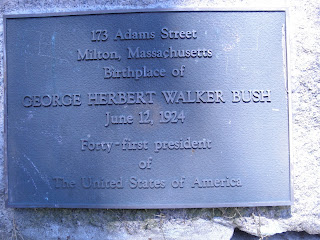 |
| George H. W. Bush Birthplace Milton, Massachusetts |
One of the great joys of this project has been the amount of care that goes into the upkeep of the houses. Maintaining a historic home is a labor of love that needs both funding and the passion of people who care. The fact that so many sites still exist today, even for the most obscure presidents is a testament to the people who keep them going.
 |
| Plaque on a rock in front of the house |
I almost wished I hadn't, because it upset me. I couldn't describe it as dilapidated, but it certainly wasn't in good shape. I wasn't expecting this, mostly because the other houses in the area look to be about the same age and are in excellent condition. The house itself was a large wooden Victorian with a welcoming front porch, and if taken care of, would be quite beautiful. I hope that someday soon the house will find a champion and be preserved as befits the birthplace of a president.














